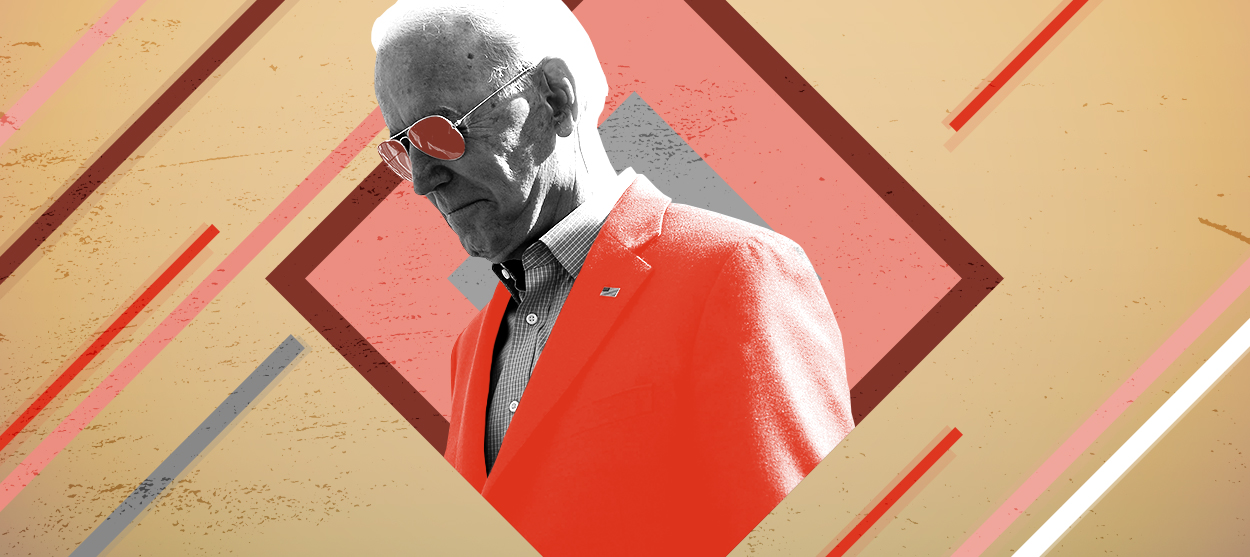Joe Biden is a single-issue candidate
He only asked voters to answer one question — and made it easy for them to say yes


A free daily email with the biggest news stories of the day – and the best features from TheWeek.com
You are now subscribed
Your newsletter sign-up was successful
The Democratic primary race is just about over. Joe Biden's projected victories in states including Michigan, Mississippi, and Missouri on Tuesday may not have officially clinched the nomination, but the former vice president's success looks increasingly likely — very nearly inevitable. The odds of a contested convention, which could have delivered a win to Sen. Bernie Sanders (I-Vt.) had more candidates remained in the race, are now vanishingly low; and anyway, the Democratic Party's superdelegate system means that in this two-man contest, Sanders would need to win the first ballot at the convention if he were to win at all. Next week, Biden is forecast to take majorities in three more high-delegate states (Florida, Illinois, and Ohio), enough to foreclose any last hope of a Sanders comeback.
But how? How did Biden emerge triumphant after months of uninspiring debate performances, middling fundraising numbers, minimal ground game, gaffes on gaffes on outright tall tales, and a long record of political positions now outré among much of the Democratic base?
Proffering a unifying theory of millions of people's voting choices is a fool's errand. But if I had to name a single leading cause for Biden's dominance, it's that his campaign only asked voters to answer one question. Every other candidate in the race asked two.
The Week
Escape your echo chamber. Get the facts behind the news, plus analysis from multiple perspectives.

Sign up for The Week's Free Newsletters
From our morning news briefing to a weekly Good News Newsletter, get the best of The Week delivered directly to your inbox.
From our morning news briefing to a weekly Good News Newsletter, get the best of The Week delivered directly to your inbox.
To support any non-Biden contender, Democratic primary voters had to say yes twice:
1. Do you want President Trump out of office?
2. Do you support this candidate and their agenda?
To support Biden, they only had to say yes once:
A free daily email with the biggest news stories of the day – and the best features from TheWeek.com
1. Do you want President Trump out of office?
The difference here isn't that Biden has no personality or agenda for voters to consider and accept. It's just they already did that. It's easy to feel like you made your assessment and decision about Biden years ago, in 2008 or 2012, and among Democrats, that decision was broadly affirmative.
There are real policy differences between Biden and former President Barack Obama, but Biden has emphasized the continuity his election would represent. Thus, as a person and policymaker, Biden doesn't seem like a new choice. He's already passed muster. Most Democratic voters have already determined they're fine with seeing him in the White House. They accepted the premise of Biden's leadership 12 years ago, and 12 years is a long time for a mental habit to solidify.
Confirmation bias is enormously powerful — and useful! It helps us sort through information overload, which is handy when you have to pick from among two dozen Democratic presidential candidates, each with long lists of policy ideas. But it also means Biden's campaigning can be lackadaisical and messy because the new information generated by his failures on the trail will never break through to the many, many voters who already assigned him a positive association more than a decade ago. Their brains, entirely normally and understandably, have no interest in making the same decision twice.
There are lots of reasons Biden is an enormously unpopular choice among younger voters, but this lack of pre-established acceptability is undoubtedly part of it. If you were too young to vote in 2008 or 2012, you probably didn't make a firm decision about the veep candidate. You didn't cement a strong opinion of Biden, and that enables you to notice and be influenced by new data about him in 2020.
This luxury of low-consequence campaigning is available to Biden alone purely because no other candidate in the race was Obama's vice president. No other candidate won the basic approval of a majority of their party eight or 12 years ago. No other candidate benefits from anything like the same confirmation bias. And no other candidate has the history to offer to undo the entire Trump presidency.
Moreover, for long-lasting Biden rivals like Sanders and Sen. Elizabeth Warren (D-Mass.) in particular, that second question was huge. To be sure, for many voters their agendas were incredibly appealing. That's precisely why Sanders and Warren lasted so long: Their messages resonated with a lot of people. But they were nevertheless big and complicated messages which required voters to sift through a ton of new information.
Backing Biden doesn't have that requirement. So while his competitors pitch grand ideas to transform our country, he can simply say, "Hey, what we were doing before was pretty okay. Wanna go back to that?" And from South Carolina's primary onward, the results suggest the bulk of Democratic voters are content to answer that single question "yes."
Want more essential commentary and analysis like this delivered straight to your inbox? Sign up for The Week's "Today's best articles" newsletter here.
Bonnie Kristian was a deputy editor and acting editor-in-chief of TheWeek.com. She is a columnist at Christianity Today and author of Untrustworthy: The Knowledge Crisis Breaking Our Brains, Polluting Our Politics, and Corrupting Christian Community (forthcoming 2022) and A Flexible Faith: Rethinking What It Means to Follow Jesus Today (2018). Her writing has also appeared at Time Magazine, CNN, USA Today, Newsweek, the Los Angeles Times, and The American Conservative, among other outlets.
-
 6 of the world’s most accessible destinations
6 of the world’s most accessible destinationsThe Week Recommends Experience all of Berlin, Singapore and Sydney
-
 How the FCC’s ‘equal time’ rule works
How the FCC’s ‘equal time’ rule worksIn the Spotlight The law is at the heart of the Colbert-CBS conflict
-
 What is the endgame in the DHS shutdown?
What is the endgame in the DHS shutdown?Today’s Big Question Democrats want to rein in ICE’s immigration crackdown
-
 The ‘mad king’: has Trump finally lost it?
The ‘mad king’: has Trump finally lost it?Talking Point Rambling speeches, wind turbine obsession, and an ‘unhinged’ letter to Norway’s prime minister have caused concern whether the rest of his term is ‘sustainable’
-
 The billionaires’ wealth tax: a catastrophe for California?
The billionaires’ wealth tax: a catastrophe for California?Talking Point Peter Thiel and Larry Page preparing to change state residency
-
 Bari Weiss’ ‘60 Minutes’ scandal is about more than one report
Bari Weiss’ ‘60 Minutes’ scandal is about more than one reportIN THE SPOTLIGHT By blocking an approved segment on a controversial prison holding US deportees in El Salvador, the editor-in-chief of CBS News has become the main story
-
 Memo signals Trump review of 233k refugees
Memo signals Trump review of 233k refugeesSpeed Read The memo also ordered all green card applications for the refugees to be halted
-
 Has Zohran Mamdani shown the Democrats how to win again?
Has Zohran Mamdani shown the Democrats how to win again?Today’s Big Question New York City mayoral election touted as victory for left-wing populists but moderate centrist wins elsewhere present more complex path for Democratic Party
-
 Millions turn out for anti-Trump ‘No Kings’ rallies
Millions turn out for anti-Trump ‘No Kings’ ralliesSpeed Read An estimated 7 million people participated, 2 million more than at the first ‘No Kings’ protest in June
-
 Democrats: Harris and Biden’s blame game
Democrats: Harris and Biden’s blame gameFeature Kamala Harris’ new memoir reveals frustrations over Biden’s reelection bid and her time as vice president
-
 ‘We must empower young athletes with the knowledge to stay safe’
‘We must empower young athletes with the knowledge to stay safe’Instant Opinion Opinion, comment and editorials of the day
